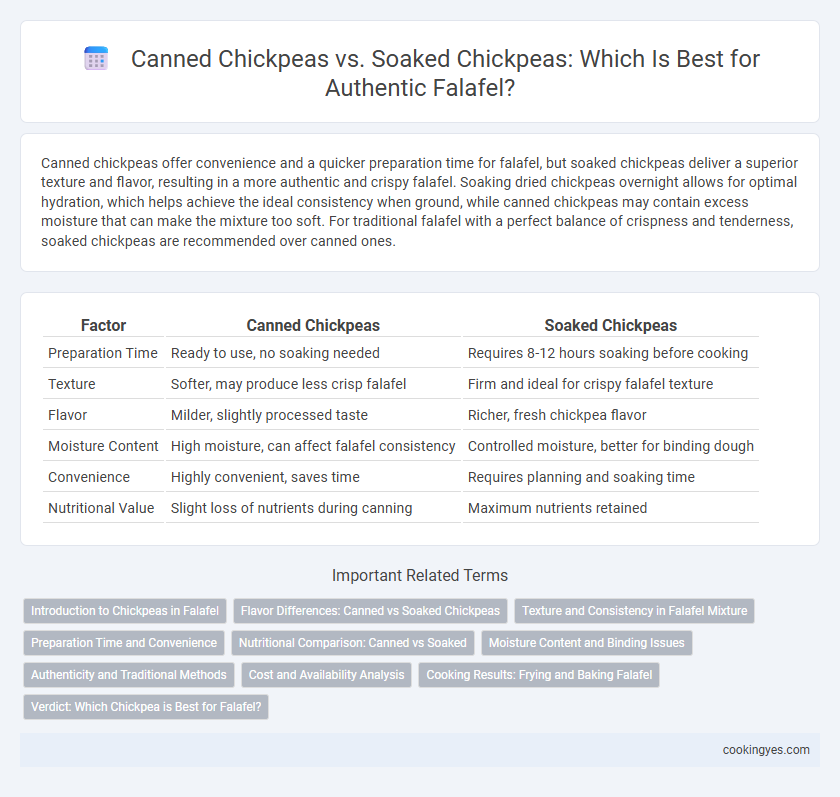Canned chickpeas offer convenience and a quicker preparation time for falafel, but soaked chickpeas deliver a superior texture and flavor, resulting in a more authentic and crispy falafel. Soaking dried chickpeas overnight allows for optimal hydration, which helps achieve the ideal consistency when ground, while canned chickpeas may contain excess moisture that can make the mixture too soft. For traditional falafel with a perfect balance of crispness and tenderness, soaked chickpeas are recommended over canned ones.
Table of Comparison
| Factor | Canned Chickpeas | Soaked Chickpeas |
|---|---|---|
| Preparation Time | Ready to use, no soaking needed | Requires 8-12 hours soaking before cooking |
| Texture | Softer, may produce less crisp falafel | Firm and ideal for crispy falafel texture |
| Flavor | Milder, slightly processed taste | Richer, fresh chickpea flavor |
| Moisture Content | High moisture, can affect falafel consistency | Controlled moisture, better for binding dough |
| Convenience | Highly convenient, saves time | Requires planning and soaking time |
| Nutritional Value | Slight loss of nutrients during canning | Maximum nutrients retained |
Introduction to Chickpeas in Falafel
Chickpeas, the essential ingredient in falafel, can be used either canned or soaked, each impacting texture and flavor. Soaked chickpeas provide a firmer, more authentic falafel with a traditional grainy texture, while canned chickpeas offer convenience but may result in a softer, less crisp patty. Understanding the differences between canned and soaked chickpeas helps optimize falafel preparation for the desired taste and consistency.
Flavor Differences: Canned vs Soaked Chickpeas
Soaked chickpeas offer a fresher, nuttier flavor and firmer texture that enhances traditional falafel's authenticity. Canned chickpeas, pre-cooked and softer, yield a milder taste with less depth, often resulting in less crispy falafel. Soaking raw chickpeas allows for better flavor development and improved binding, critical for achieving the ideal falafel consistency and richness.
Texture and Consistency in Falafel Mixture
Canned chickpeas tend to produce a softer, less textured falafel mixture due to their higher moisture content, which can result in a denser and less crispy final product. Soaked chickpeas, which are soaked overnight and not cooked, provide a firmer texture and better consistency, allowing for a crispier and more cohesive falafel that holds its shape during frying. The slightly granular texture of soaked chickpeas contributes to the traditional coarse and crumbly falafel texture preferred in authentic recipes.
Preparation Time and Convenience
Using canned chickpeas for falafel significantly reduces preparation time since they are already cooked and soft, allowing immediate blending and shaping. Soaked chickpeas require an overnight soak and longer cooking, extending the preparation process but providing a firmer texture that some chefs prefer for authentic falafel. Convenience and speed favor canned chickpeas, while soaked chickpeas offer traditional texture and flavor control.
Nutritional Comparison: Canned vs Soaked
Soaked chickpeas retain higher levels of nutrients such as folate, fiber, and antioxidants compared to canned chickpeas, which often undergo heat processing that reduces these beneficial compounds. Canned chickpeas contain added sodium and preservatives, increasing their sodium content significantly, while soaked chickpeas offer a lower-sodium, more natural option. For falafel preparation, soaked chickpeas provide better nutritional value and improved texture, essential for authentic, health-conscious recipes.
Moisture Content and Binding Issues
Canned chickpeas contain higher moisture content, often resulting in a wetter falafel mixture that can cause binding issues and difficulty achieving a crispy texture. Soaked chickpeas absorb water but retain a firmer consistency, providing better control over moisture levels and improved binding for a cohesive falafel dough. Adjusting moisture content by draining canned chickpeas thoroughly or drying soaked chickpeas is essential to optimize texture and structural integrity in falafel preparation.
Authenticity and Traditional Methods
Soaked chickpeas maintain the authentic texture and flavor essential for traditional falafel, providing a firmer and more consistent bite compared to canned chickpeas. The traditional method of soaking dried chickpeas overnight preserves the legumes' natural moisture and allows for optimal blending, resulting in a falafel mixture that holds together well during frying. Using soaked chickpeas honors cultural culinary practices and delivers the genuine taste profile valued in Middle Eastern falafel recipes.
Cost and Availability Analysis
Canned chickpeas offer convenience with consistent availability year-round, typically costing more per ounce due to processing and packaging. Soaked chickpeas require pre-preparation but are significantly cheaper in bulk, making them a cost-effective choice for large-scale or frequent falafel production. The decision hinges on balancing upfront labor with ingredient expense, where canned chickpeas provide simplicity and soaked chickpeas maximize savings.
Cooking Results: Frying and Baking Falafel
Canned chickpeas offer convenience but tend to produce falafel with a softer texture and slightly less crispiness when fried or baked due to their higher moisture content. Soaked chickpeas, soaked for 12-24 hours, yield a firmer, denser falafel with a better crumb structure, resulting in a crispier exterior and improved hold during frying or baking. For optimal cooking results, soaked chickpeas are preferred to achieve authentic falafel texture and flavor.
Verdict: Which Chickpea is Best for Falafel?
Soaked chickpeas yield a superior texture and authentic flavor for falafel, providing a firmer bite and better binding compared to canned chickpeas. Canned chickpeas, while convenient, tend to result in a mushier falafel due to their higher moisture content and softness. For the best falafel, soaked dried chickpeas are recommended to achieve the traditional crispy exterior and tender interior.
Canned chickpeas vs Soaked chickpeas for Falafel Infographic

 cookingyes.com
cookingyes.com